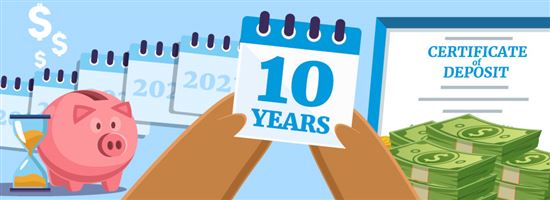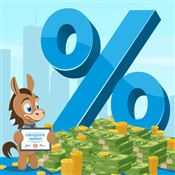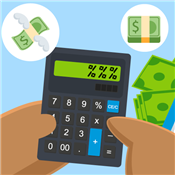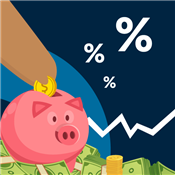10 Year CD Rates
Ad Disclosure: This article contains references to products from our partners. We may receive compensation if you apply or shop through links in our content. This compensation may impact how and where products appear on this site. You help support CreditDonkey by using our links.
Ready to invest for the long haul? Prepare for your future and explore the top 10-year CD rates.
 |
- Credit Human Federal Credit Union:
120-Month CD - 3.75% APY - Apple Federal Credit Union:
120-Month CD - 3.65% APY - The Summit Federal Credit Union:
10-Year CD - 3.35% APY - Redstone Federal Credit Union:
120-Month CD - 3.14% APY - FORUM Credit Union:
120-Month CD - 3.50% APY - Vio Bank:
120-Month CD - 2.75% APY
Making investment decisions with the future in mind is a big move. Imagine a decade from now, regretting an investment you made today.
If you want to preserve your savings and earn stable interest, 10-year CDs might be a good fit. But they are not for everyone. Take a look at the best 10-year CD rates and find out if you should get one.
Credit Human Federal Credit Union: 120-Month CD - 3.75% APY
Apple Federal Credit Union: 120-Month CD - 3.65% APY
The Summit Federal Credit Union: 10-Year CD - 3.35% APY
Redstone Federal Credit Union: 120-Month CD - 3.14% APY
FORUM Credit Union: 120-Month CD - 3.50% APY
Vio Bank: 120-Month CD - 2.75% APY
Bank of America: 120-Month CD - 0.03% APY
Chase: 120-Month CD - 0.01% APY
The information for the 120-Month CD has been collected independently by CreditDonkey. The details on this page have not been reviewed or provided by the bank.
KeyBank: 120-Month CD - 0.05% APY
PNC Bank 120 Month CD - Up to 0.03% APY
What is a 10-Year CD?
A 10-year certificate of deposit (CD) is a long-term savings account that holds a fixed amount of money for a decade or 120 months. In exchange, you get a fixed rate that will not change during the term.
Typically, you cannot add or withdraw your funds until maturity. If you do close your CD before the term ends, expect to pay early withdrawal penalties.
10-year CDs aren't commonly offered by banks and credit unions. And, these may not have the best rates. But they are a good option to save for the long haul.
10-year CDs can be offered by banks and credit unions. But this long-term CD isn't very common, so institutions that do carry them are far in between. You can check a bank's website or visit a nearby branch to see if 10-year CDs are available.
How Much Interest Does a 10-Year CD Earn?
If you had $10,000 in a 10-year CD that pays 3% APY, you can earn a little over $3,400 when it matures. A higher APY will increase your earnings, but 10-year CDs might not have the best rates.
With long-term CDs, you'd typically want to park a larger amount of money to maximize the earnings from the long term.
Here's a table to illustrate how much you can get on a 10-year CD with different deposit amounts and APYs.
| Rate | $6,500 | $10,000 | $25,000 |
|---|---|---|---|
| 0.00% | $6,500 | $10,000 | $25,000 |
| 0.50% | $6,832 | $10,511 | $26,279 |
| 1.00% | $7,180 | $11,046 | $27,616 |
| 1.50% | $7,544 | $11,605 | $29,014 |
| 2.00% | $7,923 | $12,190 | $30,475 |
| 2.50% | $8,321 | $12,801 | $32,002 |
| 3.00% | $8,735 | $13,439 | $33,598 |
| 3.50% | $9,169 | $14,106 | $35,265 |
| 4.00% | $9,622 | $14,802 | $37,006 |
| 4.50% | $10,094 | $15,530 | $38,824 |
Is a 10-Year CD Worth It?
A 10-year CD could be good if you're simply looking to save your money and earn some interest for little to no risk. But it's best to get one when APYs are high so you can lock in a high rate, even if rates fall later.
Also, make sure that it will fit well with your long-term financial goals. For example, if you're preparing for retirement and want to safely store your money for the long haul, then a 10-year CD would make sense.
On the other hand, if you have a high-risk appetite or looking to save for short-term goals, there are better options out there.
Who Should Get a 10-Year CD?
10-year CDs work great for individuals who tend to avoid risks and don't mind parking their money for a decade. People preparing for retirement or those with extra money to place in different investments are some examples.
If this sounds like you, you might consider getting a long-term CD. But remember that withdrawing your CD early will incur penalties. If you need easy access to your funds, it may be better to consider other options like a high-yield savings account.
Can I lose money on a 10-year CD?
Generally, you won't lose money on CDs. 10-year CDs are federally insured up to $250,000 for banks and credit unions that are members of the FDIC or the NCUA.
The most common situation to lose money on a CD is when you pay early withdrawal penalties. It can get costly for 10-year CDs as penalties usually cost several months to a few years' worth of interest.
Close your CD early enough and the charges can eat into your earnings, and sometimes a part of your principal.
Generally, if you withdraw your CD before the term ends, you will be paying early withdrawal fees. Penalties on long-term CDs can cost from several months' worth to years' worth of interest. Thus, it is best to keep your money untouched to maximize your returns.
10-year CD Pros and Cons
Here are the pros and cons of a 10-year CD to better understand whether getting one is a good idea for you.
Pros
- Low risk with guaranteed returns
CDs are federally insured so you're less likely to lose your money. Plus, your APY is fixed for the next decade for guaranteed earnings. - Prepared for possible decreases in interest rates
A high-interest rate environment won't last forever. If you get a 10-year CD before market rates decrease, you would still be earning good because your rate is fixed. - Better rates than regular savings accounts
10-year CDs might not give the highest rates, but there are some with better offers than a standard savings account.
Cons
- Limited liquidity for a decade
It is typical for most CDs to not allow withdrawals or deposits, making your funds inaccessible for 10 years. Be sure you won't need the money any time soon or you'll have to pay hefty early withdrawal penalties. - Miss out on better rates or investments
If you commit to a 10-year CD, you may have to pass on higher CD rates when you do it too early. Additionally, if better investments come along and you want to change your strategy, you'll have a hard time pivoting. - Inflation risks
Unfortunately, even if CDs are considered safe, they are still vulnerable to inflation. Long-term CDs may not grow fast enough to keep up with inflation, especially if it continues to increase indefinitely.
Generally, it's best to get a CD when interest rates are high. You can predict the movement of CD rates by looking out for Fed Funds rate changes or monitoring the Treasury yield. CD rates typically move with them.
Does a 10-Year CD Have a High APY?
CD rates in general tend to be high today, particularly for short-term to mid-term CDs. But, 10-year CDs usually don't have the best rates. Due to the extreme term length, institutions give it lower APY as a precaution for how the Fed Funds rate could move in the future.
While you may not get the highest rates on 10-year CDs, getting one is still a good strategy to guard against possible decreasing interest rates.
As a rule, it's best to get a 10-year CD when interest rates are at their highest. But you'll need to time it perfectly to avoid missing out on better rates. You can check the Treasury yield trend or watch out for Fed Funds rate changes to predict a good time to get a CD.
How to Choose the Best 10-Year CD
If you want to be thorough in looking for a 10-year CD, here's what you should look out for.
- APY
Higher APYs are better, but 10-year CDs often don't offer the best rates. Shop for the best rates by checking online banks and credit unions or asking your bank's account manager. - Early withdrawal penalties
If closing your CD before maturity is likely, it is best to have a CD with relatively low early withdrawal penalties to avoid losing too much of your earnings. For 10-year CDs, penalties can cost several months' to a few years' worth of interest. - Minimum deposit requirement
You might need to meet a minimum deposit to open a CD at a particular bank. Make sure to find one that works with your budget. - Institution's stability
Since you are saving for the long term, you want to work with a bank or credit union that will operate for the next decade and beyond. Although CDs are federally insured, you're still better off with a reputable and stable institution for the long haul.
Alternatives to a 10-Year CD
A 10-year CD is not for everyone. But if you're looking to invest for the long haul, here are other options you can consider.
- Build a CD ladder with short-term CDs
A CD ladder is a strategy where your money is split up into multiple CDs with different rates and terms.This way, you can take advantage of competitive rates offered on short-term CDs. And you get more flexibility with your money since the CDs mature in shorter intervals.
You'll want to build a ladder that spans a decade. Test out a CD ladder for the next 10 years using this free CD ladder calculator.
- High-Yield Savings Accounts
Online high-yield savings accounts might offer better rates and better accessibility. But unlike CDs, rates on savings accounts can change anytime depending on the market.Compare Savings Account Offers- CIT Bank Platinum Savings:
3.75% APY - UFB Portfolio Savings:
Earn up to 3.26% APY - Western Alliance Bank:
High-Yield Savings Premier - 3.80% APY - Mission Valley Bank:
High Yield Savings Account - 3.86% APY - Axos ONE:
Earn up to 4.21% APY - Quontic:
High Yield Savings - 3.50% APY - Valley National Bank:
High-Yield Savings Account - 3.95% APY - Live Oak Bank:
Personal Savings - Earn 3.80% APY - Raisin:
High-Yield Savings Account - Up to $1,500 Bonus - Current Savings:
Up to 4.00% bonus
- CIT Bank Platinum Savings:
- Money Market Accounts
A money market account has the features of a savings account and a checking account. You get the flexibility you need with your money but the rates are variable.Compare Money Market Account Offers- UFB Portfolio Money Market:
Earn up to 3.26% APY
- UFB Portfolio Money Market:
- Traditional or Roth IRA accounts
If preparing for retirement is your goal, opening an Individual Retirement Account (IRA) would be a good option. These give tax advantages that help you invest or save for retirement. For example, earnings and withdrawals on Roth IRAs are tax-free.Are CDs taxed?
Unfortunately, yes. If you've earned more than $10/year in interest on your 10-year CD, the interest is considered income and is taxable at state and federal levels. Usually, your bank will send you a 1099-INT form and you have to report it when you file your taxes.[1] - Bonds
Treasury bonds or good corporate bonds could give you fixed earnings over time. Treasury bonds are backed by the government, so your money is secure. But you'll need to do your homework when choosing corporate bonds, so make sure you look for stable and reputable companies to invest in.If you want some flexibility, you can invest in bond ETFs (exchange-traded funds). But this will carry a bit of risk just like trading normally on the stock market.
10-Year CD FAQs
Where should you open a CD?
If you're worried about the safety of your funds and earnings, opening a CD at large, reputable banks can offer more security. But if you want to find higher rates, try online banks or credit unions.
Online banks and credit unions can offer good rates because of their relatively low overhead costs. Credit unions, in general, can also be good as operating not-for-profit lets them offer better rates to their members.
How do I open a 10-year CD?
10-year CDs aren't very common but these are typically offered by banks and credit unions. Visit their websites or nearby branches to check availability. Some CDs can be opened online with proper IDs, and some in person at a physical location.
What other CD terms are available?
CD terms can range from as short as 1 month and up to 10 years in length. However, not all banks will offer the same CD terms. If you can't find a 10-year CD at your usual institution, try shopping around other banks and credit unions.
What are the types of CDs?
Here's a list of different types of CDs available on the market:
- Term CD: standard CDs with a fixed rate for a fixed term
- No-Penalty CD: allows you to withdraw money early without any withdrawal penalties
- Bump-Up CD: includes an option to increase your rate during the term of the CD
- Add-on CD: includes an option to add more deposits to your CD balance
- Jumbo CD: for large deposits of usually $100,000+
- IRA CD: offers tax advantages for retirement savings
Bottom Line
10-year CDs are good for the risk-averse and are setting up for the long haul. But they may not be the best in terms of APY. So you'll probably want to look at other products if you want higher returns.
Ultimately, you should choose a CD that satisfies most of your needs and preferences. If a CD is not the best fit, assess your goals and look for investments that will be a better fit.
References
- ^ IRS. Topic No. 403, Interest Received, Retrieved 10/27/2023
Write to Rue Atanacio at feedback@creditdonkey.com. Follow us on Twitter and Facebook for our latest posts.
Note: This website is made possible through financial relationships with some of the products and services mentioned on this site. We may receive compensation if you shop through links in our content. You do not have to use our links, but you help support CreditDonkey if you do.
|
|
| ||||||
|
|
|






